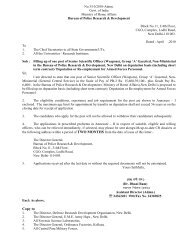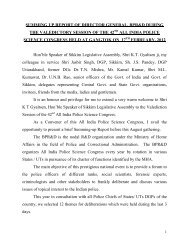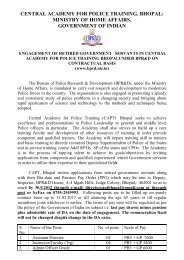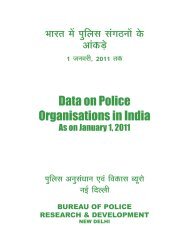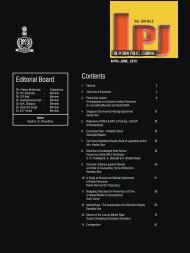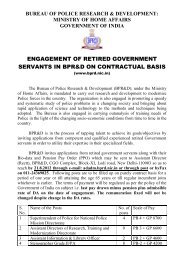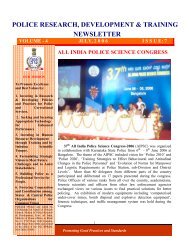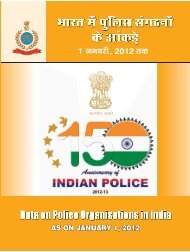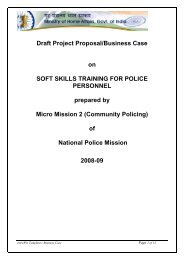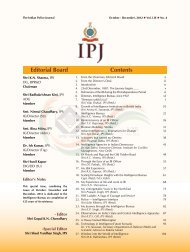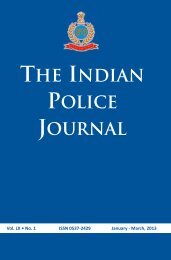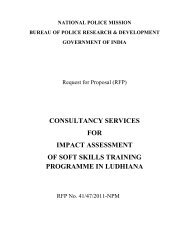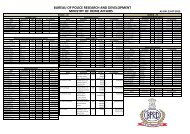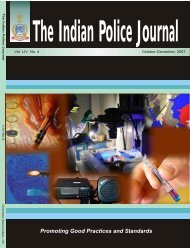SUPREME COURT & HIGHCOURT Rulings on POLICE
SUPREME COURT & HIGHCOURT Rulings on POLICE
SUPREME COURT & HIGHCOURT Rulings on POLICE
You also want an ePaper? Increase the reach of your titles
YUMPU automatically turns print PDFs into web optimized ePapers that Google loves.
a court having jurisdicti<strong>on</strong> over the local area within the limits of such police stati<strong>on</strong><br />
would have power to enquire into or try under the provisi<strong>on</strong>s of Chapter XIII. However,<br />
sub-secti<strong>on</strong> (2) of Secti<strong>on</strong> 156 makes the positi<strong>on</strong> clear by providing that no proceeding<br />
of a police officer in any such case shall at any stage be called in questi<strong>on</strong> <strong>on</strong> the<br />
ground that the case was <strong>on</strong>e which such officer was not empowered to investigate.<br />
After investigati<strong>on</strong> is completed, the result of such investigati<strong>on</strong> is required to be<br />
submitted as provided under Secti<strong>on</strong> 168, 169 and 170. Secti<strong>on</strong> 170 specificity provides<br />
that if, up<strong>on</strong> an investigati<strong>on</strong>, it appears to the officer in charge of the police stati<strong>on</strong> that<br />
there is sufficient evidence Of reas<strong>on</strong>able ground of suspici<strong>on</strong> to justify the forwarding of<br />
the accused to a Magistrate, such officer shall forward the .accused under custody to a<br />
Magistrate empowered to take cognizance of the offence up<strong>on</strong> 8' police report and to try<br />
the accused. or commit for trial. Further, if the investigati<strong>on</strong> officer arrives at the<br />
c<strong>on</strong>clusi<strong>on</strong> that the crime was not committed within the territorial jurisdicti<strong>on</strong> of the<br />
police stati<strong>on</strong>, then FIR can be forwarded to the police stati<strong>on</strong> having jurisdicti<strong>on</strong> over<br />
the area in which the crime is committed. But this would not mean that in a case which<br />
requires investigati<strong>on</strong> the police officer can refuse to record the FIR and/or investigate it.<br />
(emphasis supplied)<br />
A reading of Secti<strong>on</strong>s 177 and 178 CrPC would make it clear that Secti<strong>on</strong> 177 provides<br />
for "Ordinary" place of enquiry or trial. Secti<strong>on</strong> 178, inter alia, provides for place of<br />
enquiry or trial when it is uncertain in which of several local areas an offence was<br />
committed or where the offence was committed partly in <strong>on</strong>e local area and partly in.<br />
another and where it c<strong>on</strong>sisted of several acts d<strong>on</strong>e in different local areas, it could be<br />
enquired -into or tried by a court having jurisdicti<strong>on</strong> over early of such local areas.<br />
Hence, at the stage of investigati<strong>on</strong>, it cannot be held that the SHO does not have<br />
territorial jurisdicti<strong>on</strong> to investigate the crime.<br />
The legal positi<strong>on</strong> is well settled that if an offence is disclosed the court will not normally<br />
interfere with an investigati<strong>on</strong> into the case and will permit investigati<strong>on</strong> into the offence<br />
alleged to be completed. If the FIR, prima facie, discloses the commissi<strong>on</strong> of an offence,<br />
the court does not normally stop the investigati<strong>on</strong>, for, to do so wou1d be to trench up<strong>on</strong><br />
the lawful power of the police to investigate into cognizable offences. It is also settled by<br />
a l<strong>on</strong>g course of decisi<strong>on</strong>s of the Supreme Court that for the purpose of exercising its<br />
power under Secti<strong>on</strong> 482 Cr PC to quash an FIR or a complaint, the High Court would<br />
have to proceed entirely <strong>on</strong> the basis of the allegati<strong>on</strong>s made in the complaint or the<br />
documents accompanying the same perse; it has no jurisdicti<strong>on</strong> to examine the<br />
correctness or otherwise of the allegati<strong>on</strong>s.<br />
3




